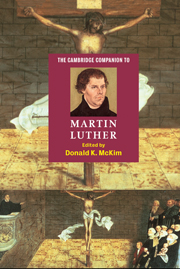Book contents
- Frontmatter
- Part I Luther’s life and context
- Part II Luther’s work
- 3 Luther’s writings
- 4 Luther as Bible translator
- 5 Luther as an interpreter of Holy Scripture
- 6 Luther’s theology
- 7 Luther’s moral theology
- 8 Luther as preacher of the Word of God
- 9 Luther’s spiritual journey
- 10 Luther’s struggle with social-ethical issues
- 11 Luther’s political encounters
- 12 Luther’s polemical controversies
- Part III After Luther
- Part IV Luther today
- Select bibliography
- Index
10 - Luther’s struggle with social-ethical issues
from Part II - Luther’s work
Published online by Cambridge University Press: 28 May 2006
- Frontmatter
- Part I Luther’s life and context
- Part II Luther’s work
- 3 Luther’s writings
- 4 Luther as Bible translator
- 5 Luther as an interpreter of Holy Scripture
- 6 Luther’s theology
- 7 Luther’s moral theology
- 8 Luther as preacher of the Word of God
- 9 Luther’s spiritual journey
- 10 Luther’s struggle with social-ethical issues
- 11 Luther’s political encounters
- 12 Luther’s polemical controversies
- Part III After Luther
- Part IV Luther today
- Select bibliography
- Index
Summary
The crucial point to remember in discussing Luther's struggle with socialethical issues is that he understood himself to be a theologian and pastor not a sociologist or economist or politician. Indeed, Luther's ethics may be understood as pastoral care. For Luther, therefore, theology and ethics served the proclamation of the good news that salvation is received not achieved. Our justification before God “must be believed and cannot be obtained by any work, law, or merit.” In contrast to all pieties of achievement, then and now, Luther affirmed God's descent in Jesus to us rather than our striving to ascend to God. In opposition to the medieval renunciation of the world, epitomized by the image and metaphor of the ladder to heaven, Luther proclaimed that Christ could not be dragged too deeply into the flesh. Hence Luther criticized the religion of the Turks, Jews, and papists for prescribing “heavenward journeys on which the travelers will break their necks.”
The subject of theology and ethics is not God in heaven, in his absolute majesty, the “naked God,” but rather God “clothed in HisWord and promises” for us.
God says: “I do not choose to come to you in My majesty and in the company of angels but in the guise of a poor beggar asking for bread.” You may ask: “How do you know this?” Christ replies: “I have revealed to you in My Word what form I would assume and to whom you should give. You do not ascend into heaven, where I am seated at the right hand of My heavenly Father, to give Me something; no I come down to you in humility. I place flesh and blood before your door with the plea: ‘Give me a drink! . . . I do not need food in heaven. I have come all the way from Judea. Give me a drink!’ I have had it announced to all the world that whatever is done to the least of My brethren is done to me” (Matt. 25:40).
- Type
- Chapter
- Information
- The Cambridge Companion to Martin Luther , pp. 165 - 178Publisher: Cambridge University PressPrint publication year: 2003
- 9
- Cited by

